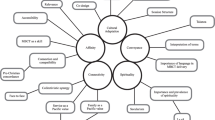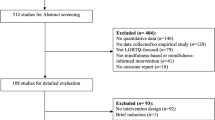Abstract
There is a need for evidence-based contextualized mental health interventions for persons living with HIV/AIDS. In the current study, the primary researcher conducted open trials with African American women living with HIV/AIDS (AAWLWHA) to examine the acceptability and feasibility of Project UPLIFT, a mindfulness-based cognitive therapy intervention that has demonstrated effectiveness in persons living with epilepsy. Women were recruited for a tele-delivered phone intervention group separated by gender identity, as well as participated in pre- and post-test assessments. Additionally, data on acceptability was collected. Both cis- and transgender women were highly satisfied with the intervention and demonstrated improvement in depressive and stress symptoms. The intervention seemed to be particularly feasible for cisgender women, though more qualitative mental health research may be warranted with transgender women. The current research has implications for the utility of mindfulness-based interventions such as UPLIFT, with AAWLWHA.
Similar content being viewed by others
References
Moneyham L, Sowell R, Seals B, Demi A. Depressive symptoms among African American women with HIV disease. Sch Inq Nurs Pract. 2000;14(1):9–39; discussion 41–6.
Cook J, Grey D, Burke-Miller J, Cohen M, Anastos K, Gandhi M, et al. Effects of treated and untreated depressive symptoms on highly active antiretroviral therapy use in a US multi-site cohort of HIV-positive women. AIDS care. 2006;18(2):93–100.
Cook JA, Burke-Miller JK, Grey DD, Cocohoba J, Liu C, Schwartz RM, et al. Do HIV-positive women receive depression treatment that meets best practice guidelines? AIDS Behav. 2014;18(6):1094–102. https://doi.org/10.1007/s10461-013-0679-6.
National Institute of Mental Health (U.S.). Depression and HIV/AIDS. NIH publication no. 02-5005.
DeMarco RF, Lanier LR. The concept of "silencing the self" in low-income, aging, HIV-infected African American women: a 10-year community-based participatory program of research with results. J Assoc Nurses AIDS Care JANAC. 2014;25(2):112–22. https://doi.org/10.1016/j.jana.2012.12.003.
Lanier L, DeMarco R. A synthesis of the theory of silencing the self and the social ecological model: understanding gender, race, and depression in African American women living with HIV infection. AIDS Patient Care STDS. 2015;29(3):142–9. https://doi.org/10.1089/apc.2014.0116.
Brownley JR, Fallot RD, Wolfson Berley R, Himelhoch SS. Trauma history in African-American women living with HIV: effects on psychiatric symptom severity and religious coping. AIDS Care. 2015;27(8):964–71. https://doi.org/10.1080/09540121.2015.1017441.
Dalmida SG, Holstad MM, Diiorio C, Laderman G. Spiritual well-being and health-related quality of life among African-American women with HIV/AIDS. Appl Res Qual Life. 2011;6(2):139–57. https://doi.org/10.1007/s11482-010-9122-6.
Dalmida SG, Holstad MM, DiIorio C, Laderman G. The meaning and use of spirituality among African American women living with HIV/AIDS. West J Nurs Res. 2012;34(6):736–65. https://doi.org/10.1177/0193945912443740.
Jones DJ, Beach SR, Forehand R, Foster SE. Self-reported health in HIV-positive African American women: the role of family stress and depressive symptoms. J Behav Med. 2003;26(6):577–99.
Whitehead NE, Hearn LE, Burrell L. The association between depressive symptoms, anger, and perceived support resources among underserved older HIV positive black/African American adults. AIDS Patient Care STDS. 2014;28(9):507–12. https://doi.org/10.1089/apc.2014.0126.
Braxton ND, Lang DL, J MS, Wingood GM, DiClemente RJ. The role of spirituality in sustaining the psychological well-being of HIV-positive black women. Women Health. 2007;46(2–3):113–29. https://doi.org/10.1300/J013v46n02_08.
Ball J, Tannenbaum L, Armistead L, Maguen S, Group FHPR. Coping and HIV infection in African-American women. Women Health. 2002;35(1):17–36. https://doi.org/10.1300/J013v35n01_02.
Owens S. African American women living with HIV/AIDS: families as sources of support and of stress. Soc Work. 2003;48(2):163–71.
Szapocznik J, Feaster DJ, Mitrani VB, Prado G, Smith L, Robinson-Batista C, et al. Structural ecosystems therapy for HIV-seropositive African American women: effects on psychological distress, family hassles, and family support. J Consult Clin Psychol. 2004;72(2):288–303. https://doi.org/10.1037/0022-006x.72.2.288.
Johnson SD, Cunningham-Williams RM, Cottler LB. A tripartite of HIV-risk for African American women: the intersection of drug use, violence, and depression. Drug Alcohol Depend. 2003;70(2):169–75.
Carlson LE. Mindfulness-based interventions for physical conditions: a narrative review evaluating levels of evidence. ISRN Psychiatry. 2012;2012:651583. https://doi.org/10.5402/2012/651583.
Duncan LG, Moskowitz JT, Neilands TB, Dilworth SE, Hecht FM, Johnson MO. Mindfulness-based stress reduction for HIV treatment side effects: a randomized, wait-list controlled trial. J Pain Symptom Manage. 2012;43(2):161–71. https://doi.org/10.1016/j.jpainsymman.2011.04.007.
Jam S, Imani AH, Foroughi M, SeyedAlinaghi S, Koochak HE, Mohraz M. The effects of mindfulness-based stress reduction (MBSR) program in Iranian HIV/AIDS patients: a pilot study. Acta Med Iran. 2010;48(2):101–6.
Moskowitz JT, Duncan LG, Moran PJ, Acree M, Epel ES, Kemeny ME, et al. Dispositional mindfulness in people with HIV: associations with psychological and physical health. Pers Individ Dif. 2015;86:88–93. https://doi.org/10.1016/j.paid.2015.05.039.
Creswell JD, Myers HF, Cole SW, Irwin MR. Mindfulness meditation training effects on CD4+ T lymphocytes in HIV-1 infected adults: a small randomized controlled trial. Brain Behav Immun. 2009;23(2):184–8. https://doi.org/10.1016/j.bbi.2008.07.004.
SeyedAlinaghi S, Jam S, Foroughi M, Imani A, Mohraz M, Djavid GE, et al. Randomized controlled trial of mindfulness-based stress reduction delivered to human immunodeficiency virus-positive patients in Iran: effects on CD4’ T lymphocyte count and medical and psychological symptoms. Psychosom Med. 2012;74(6):620–7. https://doi.org/10.1097/PSY.0b013e31825abfaa.
Gonzalez-Garcia M, Ferrer MJ, Borras X, Munoz-Moreno JA, Miranda C, Puig J, et al. Effectiveness of mindfulness-based cognitive therapy on the quality of life, emotional status, and CD4 cell count of patients aging with HIV infection. AIDS Behav. 2013. https://doi.org/10.1007/s10461-013-0612-z.
Yang Y, Liu Y-H, Zhang H-F, Liu J-Y. Effectiveness of mindfulness-based stress reduction and mindfulness-based cognitive therapies on people living with HIV: a systematic review and meta-analysis. Int J Nurs Sci. 2015;2(3):283–94. https://doi.org/10.1016/j.ijnss.2015.07.003.
Kempf MC, Huang CH, Savage R, Safren SA. Technology-delivered mental health interventions for people living with HIV/AIDS (PLWHA): a review of recent advances. Curr HIV/AIDS Rep. 2015;12(4):472–80. https://doi.org/10.1007/s11904-015-0292-6.
Thompson NJ, Patel AH, Selwa LM, Stoll SC, Begley CE, Johnson EK, et al. Expanding the efficacy of project UPLIFT: distance delivery of mindfulness-based depression prevention to people with epilepsy. J Consult Clin Psychol. 2015;83(2):304–13. https://doi.org/10.1037/a0038404.
Thompson NJ, Walker ER, Obolensky N, Winning A, Barmon C, Diiorio C, et al. Distance delivery of mindfulness-based cognitive therapy for depression: project UPLIFT. Epilepsy Behav. 2010;19(3):247–54. https://doi.org/10.1016/j.yebeh.2010.07.031.
Walker ER, Obolensky N, Dini S, Thompson NJ. Formative and process evaluations of a cognitive-behavioral therapy and mindfulness intervention for people with epilepsy and depression. Epilepsy Behav. 2010;19(3):239–46. https://doi.org/10.1016/j.yebeh.2010.07.032.
Riley KE, Kalichman S. Mindfulness-based stress reduction for people living with HIV/AIDS: preliminary review of intervention trial methodologies and findings. Health Psychol Rev. 2015;9(2):224–43. https://doi.org/10.1080/17437199.2014.895928.
Robinson FP, Mathews HL, Witek-Janusek L. Psycho-endocrine-immune response to mindfulness-based stress reduction in individuals infected with the human immunodeficiency virus: a quasiexperimental study. J Altern Complement Med. 2003;9(5):683–94. https://doi.org/10.1089/107555303322524535.
Hunter-Jones JJ, Gilliam SM, Carswell AL, Hansen NB. Assessing the acceptability of a mindfulness-based cognitive therapy intervention for African-American women living with HIV/AIDS. J Racial Ethn Health Disparities. 2019;6:1157–66.
Newkirk LA, Kim JM, Thompson JM, Tinklenberg JR, Yesavage JA, Taylor JL. Validation of a 26-point telephone version of the mini-mental state examination. J Geriatr Psychiatry Neurol. 2004;17(2):81–7. https://doi.org/10.1177/0891988704264534.
Kroenke K, Spitzer RL, Williams JB. The PHQ-9: validity of a brief depression severity measure. J Gen Intern Med. 2001;16(9):606–13.
Beck AT, Steer RA, Brown GK. Beck depression inventory-II. San Antonio. 1996;78(2):490–8.
Beck AT, Steer RA. Internal consistencies of the original and revised beck depression inventory. J Clin Psychol. 1984;40(6):1365–7.
Dori GA, Overholser JC. Evaluating depression severity and remission with a modified beck depression inventory. Personality Individ Differ. 2000;28(6):1045–61.
Eaton DK, Kann L, Kinchen S, Shanklin S, Flint KH, Hawkins J, et al. Youth risk behavior surveillance—United States, 2011. Morbid Mortal Wkly Rep. 2012;61(4):1–162.
Brown KW, Ryan RM. The benefits of being present: mindfulness and its role in psychological well-being. J Pers Soc Psychol. 2003;84(4):822.
MacKillop J, Anderson EJ. Further psychometric validation of the mindful attention awareness scale (MAAS). J Psychopathol Behav Assess. 2007;29(4):289–93.
Beck AT, Epstein N, Brown G, Steer RA. An inventory for measuring clinical anxiety: psychometric properties. J Consult Clin Psychol. 1988;56(6):893.
Cohen S. Perceived stress in a probability sample of the United States. 1988.
Hansen M, Andersen TE, Armour C, Elklit A, Palic S, Mackrill T. PTSD-8: a short PTSD inventory. Clin Pract Epidemiol Ment Health. 2010;6:101.
Chesney MA, Neilands TB, Chambers DB, Taylor JM, Folkman S. A validity and reliability study of the coping self-efficacy scale. Br J Health Psychol. 2006;11(3):421–37.
Diener E, Emmons RA, Larsen RJ, Griffin S. The satisfaction with life scale. J Pers Assess. 1985;49(1):71–5.
Newland J, Furnham A. Perceived availability of social support. Personality Individ Differ. 1999;27(4):659–63.
World Health O. WHOQOL-HIV instrument: scoring and coding for the WHOQOL-HIV instruments: users manual. World Health Organization, 2002.
Meade CS, Hansen NB, Kochman A, Sikkema KJ. Utilization of medical treatments and adherence to antiretroviral therapy among HIV-positive adults with histories of childhood sexual abuse. AIDS Patient Care STDS. 2009;23(4):259–66. https://doi.org/10.1089/apc.2008.0210.
Author information
Authors and Affiliations
Corresponding author
Additional information
Publisher's Note
Springer Nature remains neutral with regard to jurisdictional claims in published maps and institutional affiliations.
Rights and permissions
About this article
Cite this article
Hunter-Jones, J., Gilliam, S., Davis, C. et al. Process and Outcome Evaluation of a Mindfulness-Based Cognitive Therapy Intervention for Cisgender and Transgender African American Women Living with HIV/AIDS. AIDS Behav 25, 592–603 (2021). https://doi.org/10.1007/s10461-020-03017-7
Published:
Issue Date:
DOI: https://doi.org/10.1007/s10461-020-03017-7




